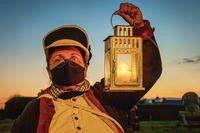Individual Americans invading other countries used to be a real problem for the fledgling United States. In fact, there were so many threats to U.S. security from its own citizens raising armies that the feds passed various Neutrality Acts to make it illegal for an American to wage war against any country at peace with the United States.
Still, it happened so often, there were two words for it, "filibustering and freebooting" -- but one man's freebooter is another man's freedom fighter, right?
Here are just a few of those American freebooters, some of whom were already judged by a jury of their peers.
1. A Former Vice President Tries to Conquer the Entire Louisiana Purchase
Aaron Burr was the third veep, serving under President Thomas Jefferson. After his tenure as VP, however, his career took a steep dive. Not one to let massive unpopularity affect his career as a political leader, Burr conspired to create his own independent nation in the middle of what was 40,000 acres of territory belonging to Spain and the United States.

He created a group of farmers, planters and Army officers, including the Army's top general, James Wilkinson, and equipped them for a fight. But before he could wage his little war, Burr was arrested and shipped back to Virginia to stand trial. Wilkinson provided the most damning evidence against Burr, who was acquitted anyway.
2. John Adams' Son-in-Law Sought to Liberate Venezuela
A prominent Revolutionary War officer, William S. Smith rose in ranks due to both his station in life and his martial ability. He began his career as an aide-de-camp but was soon on the general staff for both Lafayette and Washington. So he knew what he was doing when he secured funds, arms and mercenaries to free Venezuela from Spanish rule. The ships and 60 of the men he sent were immediately captured by Spanish authorities.

Smith was put on trial for violating the Neutrality Act of 1794, like many of the people on this list. Also like many of the people on this list, he was acquitted. He claimed Jefferson told him to do it, and it led to the landmark Supreme Court ruling that the president "cannot authorize a person to do what the law forbids." Smith later was elected to Congress.
3. Vermont Tries to Liberate Canada
The brother of famed Patriot leader Ethan Allen was less than successful in his own efforts to unshackle the New World from the British yoke. After the Revolution, Ira Allen traveled to France to gain support for leading an insurrection in Canada, seeking to create an independent "Republic of United Columbia."
Instead, he purchased 20,000 arms and 24 cannons but was captured at sea by the Royal Navy. Britain thought he was going to arm the Irish and put him on trial for that. The escapade bankrupted Allen, who died in Philadelphia hiding from his creditors.
4. Patriots from Georgia Attempt to Annex Florida
In the early days of the American experiment, everyone wanted Florida. Unfortunately, it was full of the people who owned it -- the Spanish. Americans were constantly gauging the Floridians to see whether annexation were possible. One such endeavor was led by George Mathews, a former Continental Army officer.

When the Spanish governor of East Florida reneged on a deal to cede it to the U.S., Mathews established an intelligence network and then a full-on insurgency in East Florida. His "Patriots of Amelia Island" were successful enough, but the U.S. had to deny the mission there because of the War of 1812. The insurgency soon collapsed, and Mathews died in Georgia.
5. Trying to Liberate Texas with Frenchmen
When he couldn't fight the Spanish in Florida anymore because then-Secretary of State John Quincy Adams purchased it from the Spanish, James Long set his sights on Texas. His original plan called for the use of Jean Lafitte's pirate fleet. But Lafitte refused to help.
Instead, Long recruited dozens of former French soldiers and captured Nacogdoches, and proclaimed the first Republic of Texas, which lasted a month. Not to be outdone, he returned with 300 troops before being captured and shot by the Mexicans.
6. Doctor Turned Lawyer Turned Journalist Turned Mercenary Turned Dictator
That's one hell of a resumé, and yet William Walker did it all before turning 40.
In 1853, Mexico refused to give Walker permission to establish a fortified colony in Sonora, along the Mexico-U.S. border. He returned to San Francisco and built a 45-man army of slavery supporters from Kentucky and Tennessee to conquer Sonora and Baja California, forming the Republic of Lower California with his capital at Cabo San Lucas.
After the Mexican government forced him out, he tried again to do the same thing, this time declaring the Republic of Sonora. When the Mexican Army intervened again and expelled Walker, he was tried for his illegal war in California but was acquitted in eight minutes.

Two years later, Walker turned up in Nicaragua, leading 60 "colonists" to support the government. His gang and a group of locals attacked a Conservative Party group who were in open civil war against Nicaragua's Liberal government. He inflicted heavy casualties and later captured the Liberal capital.
He ruled Nicaragua as head of the army, even being recognized by the United States' Pierce administration as the legitimate government. Fearing further conquests, nations of Central America formed an alliance to take down Walker, who surrendered to the U.S. Navy. He eventually ended up in the hands of the government of Honduras, which promptly executed him.
7. A Confederate Diplomat in Mexico Starts a Rebellion

John T. Pickett was sent to Mexico as an emissary of the Confederate government. He found the Mexican government to be less than receptive to the southern cause and more welcoming to the North. Pickett was arrested after assaulting a member of the U.S. diplomatic party by Mexican authorities.
Pickett attempted to raise a rebel army against the Mexican government but failed. He tried numerous times to negotiate a treaty to annex large parts of northern Mexico. He was again arrested by the government, thrown in jail for 30 days and expelled from the country.
8. Naval Officers Want to Conquer South America, Found Confederate Colonies Instead
Matthew Maury, the founder of the U.S. Naval Academy, sent two officers on a mission to map the Amazon for shipping purposes. The officers, loyal to the Confederate cause (as was Maury), instead mapped it to conquer it for the Confederacy. When the South lost the Civil War, Maury helped 20,000 rebels flee to Brazil, where they founded the Confederate colonies of New Texas and Americana.

9. Aiding Independence Movements Everywhere
One American thought supporting independence movements worldwide all the time should be the extent of American foreign policy and acted on it whenever possible. William A. Chanler started his career as a freedom fighter in 1902 when Dutch investors tried to overthrow Venezuela for defaulting on its loans.
Chanler created an outlaw army, recruited through Butch Cassidy, that landed in Venezuela and marched inland. The president of Venezuela finally complied with the terms of his loan, and Chanler's army withdrew. He shortly after assisted the Libyans in fighting the Italians, Somalis fighting Italians and he helped the overthrow of the Qing dynasty in China.
More posts from We Are the Mighty:
6 urban legends about Wright-Patterson Air Force Base
Why Okinawa is the most haunted place in the military
11 scary ghost stories, legends, and haunted military bases
We Are The Mighty (WATM) celebrates service with stories that inspire. WATM is made in Hollywood by veterans. It's military life presented like never before. Check it out at We Are the Mighty.
Want to Learn More About Military Life?
Whether you're thinking of joining the military, looking for post-military careers or keeping up with military life and benefits, Military.com has you covered. Subscribe to Military.com to have military news, updates and resources delivered directly to your inbox.
















